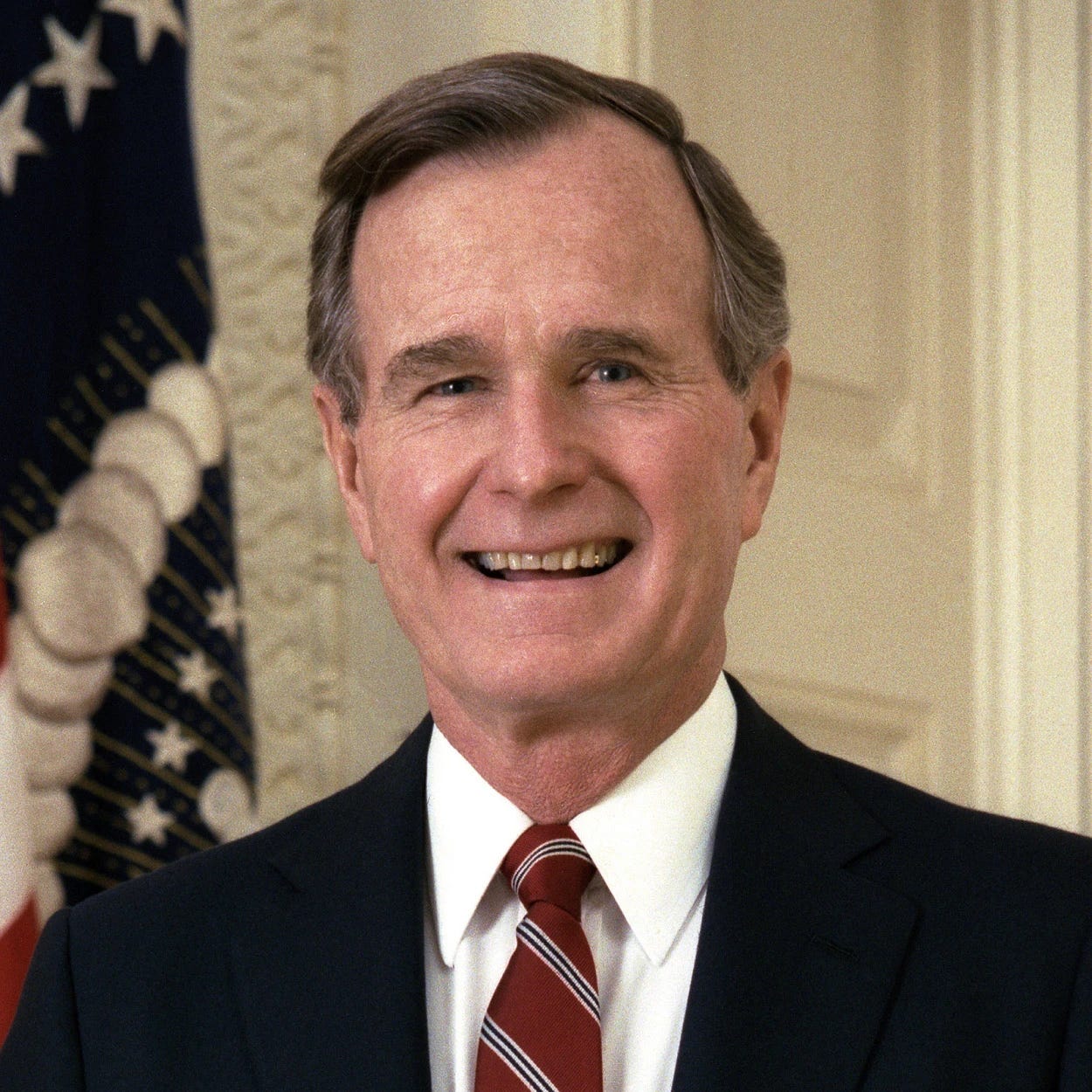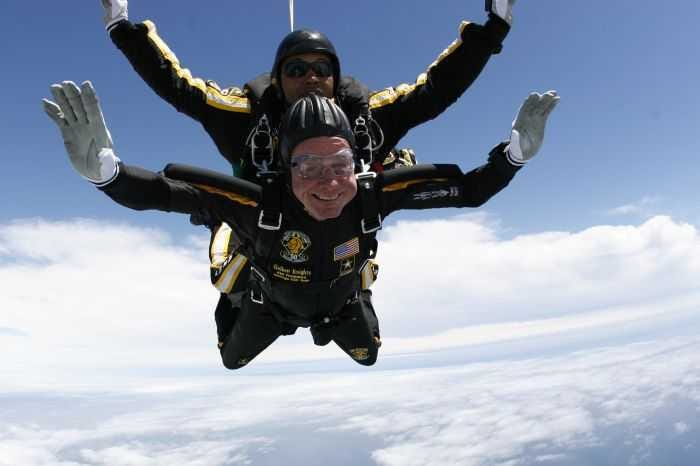Click here to go to Ronald Reagan.
George Bush lived a few lives in one. A senator’s son from a blue-blood family, he was captain of the Yale baseball team and a member of the Skull and Bones club, home of the power elite. He was a WWII vet who flew fifty-eight combat missions. He founded an oil company in Texas. He was ambassador to the UN and China. He was head of the CIA and the Republican party. He was Reagan’s vice president for two terms.
So certain that his next job would be president, Bush started his campaign for president four years early. In 1988 he was the heir apparent, but his candidacy ran into what might be called the wimp problem.
Ronald Reagan was sold to us as a cowboy and apparently Americans were not sure what to make of the soft-spoken, congenial George Bush. Despite the athlete, war veteran and CIA credentials, somehow Bush didn’t fit America’s view of masculinity. The media constantly called him a wimp.
Bush tried to overcome the label by lashing out at journalist Dan Rather, who had the audacity to ask him what he knew about the Iran Contra affair. Perhaps Bush looked like a tough guy to some, but in his diaries he admitted, “I’m one of the few people that know fully the details.”
Trailing by 17 points to Massachusetts governor Michael Dukakis, in the debate Bush tried to take a strong conservative position he’d later come to regret:
“Read my lips. No new taxes.”
-George Bush
It wasn’t until Dukakis put an army helmet on while riding in a tank that Bush started to gain momentum. The media made a huge ordeal of this alleged public relations disaster and the wimp, who wasn’t actually a wimp at all, gained traction over a guy in a helmet. Seriously, this is how we pick presidents?
Bush’s campaign was run by Lee Atwater, champion of the Southern Strategy and frequent user of the n-word. The ad featured Willie Horton, a black man who murdered and raped a white woman while released from prison under a Massachusetts program under Dukakis’ watch. Atwater wanted to “make Willie Horton Dukakis’ running mate. The ad stoked white fear and is still considered one of the most racially divisive in US politics (Atwater apologized to Dukakis on his deathbed in 1991).
Ultimately the ad helped Bush win and he became the first active vice president to be elected president since 1836. In his inaugural address, Bush said:
“We are a nation of communities…a brilliant diversity spread like stars, like a thousand points of light in a broad and peaceful sky. It is to make kinder the face of the nation and gentler the face of the world”.
-George Bush
I’m not sure who the speechwriter was that came up with that word salad, but it wasn’t easy for Bush to live up to those ideas. Warhawks like Secretary of Defense Dick Cheney didn’t see the failure of the USSR as an opportunity for peace, but rather as a way to weaken them through force. While Gorbachev was letting colonies become countries in what was essentially a peaceful revolution in Eastern Europe, the US went to war.
Bush invaded Panama in 1989. And in January of 1991, after Iraq invaded Kuwait seizing one-fifth of the world’s oil supply, Bush sent over half-million US troops to the middle east. Hailed as a war to liberate Kuwait, Iraq, formerly supported by the US, invaded only after they’d been given mixed messages that the US was not interested in helping Kuwait.
Before CNN’s Wolf Blitzer did the play by play of the scud missile attacks, Kuwait hired a public relations firm to “sell” the war to the American public. The firm was run by Bush’s former chief of staff.
When polls showed support for the pending war dipping, Dick Cheney lied on TV about Sadam’s imminent use of nuclear weapons or terrorist attacks (foreshadow alert!).
Once war became a possibility, there wasn’t a strong desire to use diplomacy over violence. In the end, the US military along with fifty other countries gave Sadaam, his feeble military and the Iraqi people an all-out ass kicking. So much for kinder, gentler.
Publicly, Bush told us that this war somehow made up for a prior terrible war:
“The ghosts of Vietnam were laid to rest in the sands of the Arabian desert.”
-George Bush
I doubt Vietnam vets or their families bought that line.
Maybe the Gulf War was another attempt to overcome that wimp label. Or maybe Bush was just part of the American system that handsomely rewarded war profiteers. Or maybe he did it for the influence over Middle East oil, the family business. Maybe Bush was in cahoots with his old Skull and Bones buddies who ruled the world like C. Montgomery Burns of The Simpsons?
Privately, Bush lamented that there was no feeling of euphoria after the Gulf War. When his administration wisely decided not to topple Sadaam and then own the inevitable Iraqi quagmire (another foreshadowing alert!), there was a national feeling of dissatisfaction with Bush. His approval rating quickly sank from its peak of 89%.
At home, Bush signed the Americans for Disability Act which definitely boosted his compassionate credentials. Bush wanted to lower the deficit that had grown in the Reagan years, but he didn’t want to cut military spending or raise taxes. It’s the same conundrum we have today - Bush II might call this fuzzy math. Eventually Bush worked with Democrats to increase taxes on the highest wage earners, which led to the budget surpluses of the Clinton years.
Apparently, the way to gain more government revenue isn’t to lower taxes!
Bush also supported the NAFTA agreement with Mexico and Canada reducing trade restrictions between the countries. In a 1992 debate, independent party candidate Ross Perot said this about NAFTA:
“We’ve got to stop sending jobs overseas. It's pretty simple: If you're paying $12 an hour for factory workers and you can move your factory South of the border, pay a dollar an hour for labor, ... have no health care—that's the most expensive single element in making a car— have no environmental controls, no pollution controls and no retirement, and you don't care about anything but making money, there will be a giant sucking sound going south.”
-Ross Perot
This is why as an eighteen-year-old I voted for Ross Perot, as did almost 20 million other people accounting for 19% of the popular vote. It’s why a centrist Democrat from Arkansas accused of rape defeated Bush in 1992, sending him back to Kennebunk as a one-term president.
Bush lived a long life, dying at the age of 94 in 2017. To outsiders he seemed like a good guy - spending time with the grandkids, his wife Barbara of seventy-three years, and skydiving at the age of 90.
In some ways Bush is a character out of Game of Thrones. He played the games of politics and war for decades at the highest levels with the most dangerous people. That he survived at all says something about the man. You and I ain’t no senator’s son, but if we were and got to do the things George Bush did, we could have done worse.
Bush gets the Career Politician label and more than any president, he was part of the machine - the machine of power and oil and war. Bush rode that wave and despite his immense power and influence, he didn’t fight the tide.
When his campaign manager ran a racist ad so he’d win the election, Bush let him.
When CEO’s wanted to export jobs and manufacturing to Mexico, Bush signed off on it.
When the Cold War ended, a different leader might have recognized the chance for peace. A different leader might not have fought a war for Earth warming oil.
But the US didn’t get a different leader from 1989-1993. We got George H.W. Bush.
Presidential Category: Career Politician
Final Grade: C-
Click here to go to Bill Clinton.






